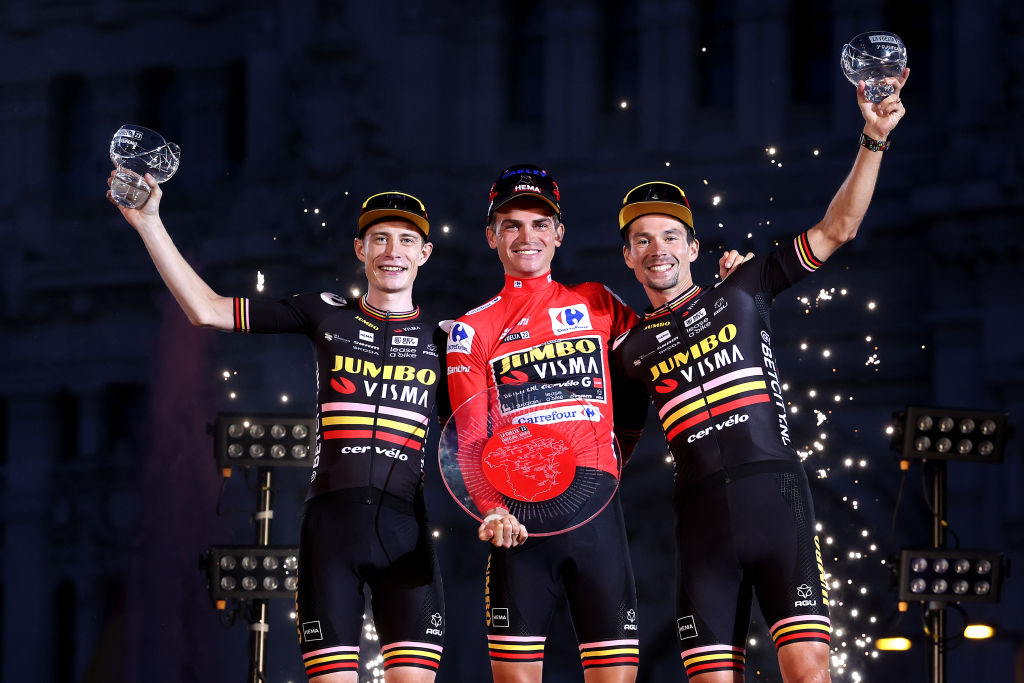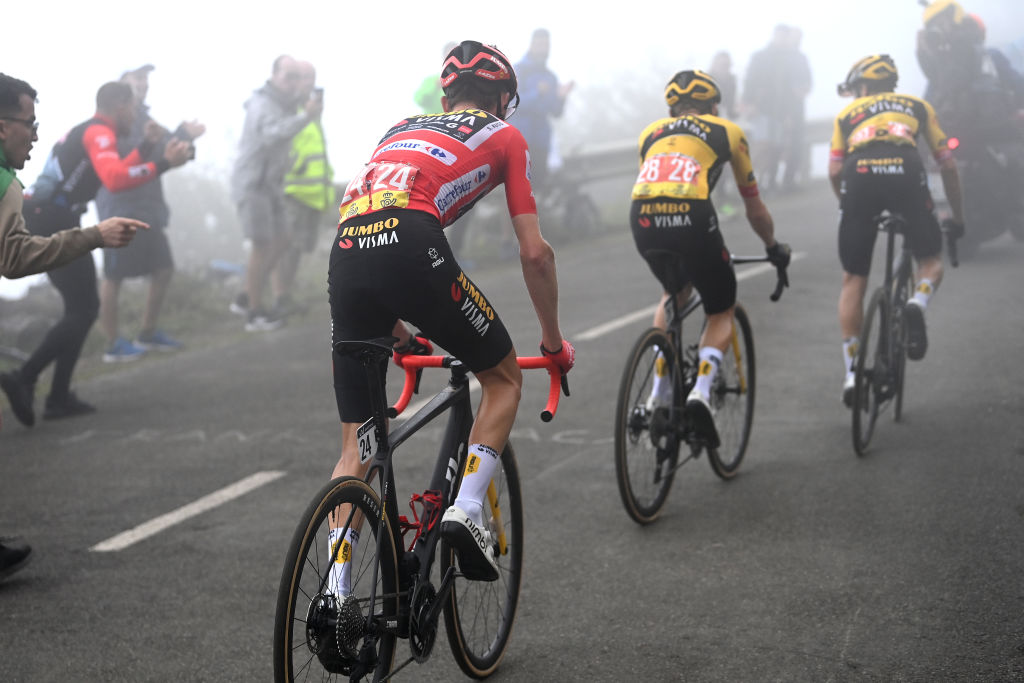
Sepp Kuss' fourteen days as leader of the Vuelta a España meant, among other things, fourteen post-stage press conferences. But whenever the American was asked how he felt about racing three Grand Tours in a single year, the his answer was almost invariably a simple one: “I recommend it.”
For Kuss personally, proof of the validity of his comment was visible in the colour of the jersey he was wearing. And, in the aftermath of Kuss’ Vuelta victory, one imagines many feasibility studies about riding all three Grand Tours must have been carried out among rival teams.
It’s partly because Kuss’ result was so remarkable. He was not just the first rider in 66 years to ride all three Grand Tours and win one of them; he also pivoted from being ‘just’ a very talented climber to becoming enough of an all-rounder to claim his first-ever Grand Tour.
It’s fair to wonder how Kuss would fared had Primoz Roglič and Jonas Vingegaard been on different teams at the Vuelta rather than part of his all-conquering Jumbo-Visma. There's little doubt, however, that his physiological state was a very strong one in his third Grand Tour of the season.
For Ineos Grenadiers head coach Xabier Artetxe, Kuss’ own mental strength was at least as important as his physical potential in September. When it comes to doing three Grand Tours and winning one, good form is obviously key, but so too is having enough psychological resilience to handle so much racing.
“Doing the three Grand Tours at a high level is not new - my idol, Marino Lejaretta, did exactly that in the 1990s, and he was one of the pioneers of the modern age,” Artetxe tells Cyclingnews.
“It’s also true that you need a good plan and Sepp Kuss had only done two races before the Giro - UAE and the Volta a Catalunya, probably taking things quite calmly in both so he’d be in top form for the summer.
“But to me, the key factor is to be psychologically prepared for it and not everybody has the kind of mentality that a guy like Sepp Kuss clearly has.”
One vital element of that special kind of personality, Artetxe says, is “being the type of guy who isn’t bothered about focusing really hard for exceptionally long periods of time on being at altitude, about eating the right kind of food, about having the right kind of weight."
“He’s maybe not the kind of guy who is a natural at leading a bike race, with all the being at the front of the bunch and all the stress management that implies," he continues. "But the rest of it - Sepp Kuss is a guy who knows how to handle all of that stuff very well.”
Kuss’ ability to stay disciplined and focused outside the Grand Tours would therefore have been as critical as keeping his eye on the ball during the race itself, Artetxe believes. As he says, after completing a Grand Tour and racing for three weeks at a physical and emotional extreme, most riders suffer from a dramatic drop off the minute the race is over. Clearly, Kuss didn’t do that this year.
“You also need to be a natural Grand Tour rider, one of those guys with specially fast recovery levels,” Artetxe says. “That’s Kuss’ case, just as it was for [2008 Tour de France winner and triple Grand tour specialist] Carlos Sastre and Lejaretta.
“But then the next big question becomes about things like controlling your weight and building up for the next Grand Tour. You’ve got four weeks or five at most between the two events and people are usually so tired, mentally, that they can’t control themselves in the couple of weeks after a Grand Tour - that's when you’ve dropped your work rate enormously and you’re simultaneously maybe eating a lot more than during the race as well.
“So your weight goes up, by two or three kilos at least, and that’s hard to control. However, if you can manage the recovery and the food consumption side of things on a psychological level, then it’s definitely possible to do.”

Switching up
If Kuss has the right kinds of mental resources to take on the Grand Tour challenge, there was also - as the American himself - a radical switch of attitude in other areas.
“He’s the kind of rider who likes to be at the back of the bunch and that is risky GC-wise because at the drop of a hat you can find yourself four minutes down," Artetxe says.
“In fact, if you look at the first days of the Vuelta when he raced in Barcelona and in the first week, he wasn’t racing for the overall. He got in the overall contention position purely because of the stage 6 breakaway to Javalambre.
“Then two things came together simultaneously. Firstly he was not a rider on the other teams’ GC radar, so he was given a much bigger margin than usual, and at the same time, he moved into a new arena.
“After that, it wasn’t exactly surprising that he did such a good time trial in Valladolid because at this point in the season, rather than purely being based on technique, time trialling is more a question of physical strength, and power-wise he had that.”
But once again, Artetxe says, the mental ability to switch to leading was clearly in Kuss’ talent set. “It’s very different to be wearing red and fighting for the overall than being at eighth or ninth, say, and when the DS says take it easy on the TT because we’ve got X as our leader. But when Kuss got up there on GC, things changed. And he knew how to handle that.”
At the same time, not being a single designated leader until the third week was a considerable advantage for Kuss, with the pressure shared out between himself, Vingegaard and Roglic. It was only in the mountains of Cantabria and Asturias on stages 16 and 17, when the GC was effectively settled in favour of Jumbo-Visma and when Kuss found himself the subject of attacks by the Dane and Slovenian, that things veered towards going dangerously awry.
Cue the famous behind-the-scenes emergency summit after the bizarre scenes on the Angliru where Kuss was isolated and suffering from ‘friendly fire,’ a meeting that seemed to restore internal order. But by then, with Remco Evenepoel (Soudal-QuickStep) out of the overall picture and the Spanish challengers unable to match any of the three Jumbo-Visma riders, the GC battle was as good as over, anyway.

The right team
As Artetxe points out, no matter what individual riders are capable of doing mentally and physically, they have to be in the right team for that potential to flourish. And there can be no doubt, he says, that Kuss’ victory in the Vuelta, together with Roglic's in the Giro and Vingegaard's in the Tour, also came about thanks to their having the right kind of team for it to happen, and not just because they avoided almost any misfortune.
“It’s not possible to win the three by chance, because even winning one is very difficult and doesn’t happen through good luck. You have to have a clear leader, a clearly structured team and no bad luck in terms of crashes, health and so on," he says.
“But they didn’t win simply because they didn’t fall off or get sick. They did it because they have great riders and strong leaders, because of the allround quality of the riders. Just look at the teammates in the Vuelta - the defending champions of the Giro and Tour, no more and no less - and their teammate, and leader, who is one of the best climbers in the world.
“They had team workers like [Robert] Gesink and [Wilco] Keldermann who have both been on the podium of Grand Tours. On top of that, a rider like Dylan Van Baarle who’s won Paris-Roubaix, been World Championships runner-up and who’s a huge all-rounder - as, given he was formerly an Ineos rider, we know very well ourselves. It’s an amazing team.
“Then on top of that, they work well, plan well. Obviously, you need a good budget, but money will only get you so far. They’ve done so much work in that aspect, to handle not just the race itself, but the build-up too, dealing with questions like the food, the form, and the altitude training camps, the hot days in the Tour…it’s lots of things that have to come together.”

The return of marginal gains
Although the term has been much maligned in recent years, as Artetxe sees it, the question of marginal gains makes for a huge difference.
“Little by little they’ve gone on building it all up, like we did in Sky, adding in more and more details. At the same time, they’ve got a big, solid pool of 10 to 12 riders they know they can depend upon for Grand Tours. So just as a while back we were a reference point for a lot of teams, now they’re the reference point that teams are looking at.”
Yet if the scale of Jumbo-Visma’s success is such that other teams are likely wondering which of their riders might benefit by having a similar program to Kuss in 2023, the question of what is in store for Kuss himself in 2024 is hardly a minor one, either. Viewed from the outside, Artetxe reckons that while Kuss’ achievements are hugely impressive, the American now has another mountain to climb: handling considerably raised expectations now that he is an established GC rider in his own right.
“Up to this year’s Vuelta, we’d never seen Kuss doing a GC for himself and he’s shown what he can do. Maybe next year, though, if they put him in the Giro, say, handling the pressure of being ahead every single day, being in the thick of the action from the get-go, is something he can’t do so well," Artetxe says.
“Sometimes it’s better being second fiddle than the leader. We know that, we did that twice - in 2018 when Geraint [Thomas] was the plan B for [Chris] Froome in the Tour de France and in the 2019 Tour when Egan [Bernal] was the plan B for Geraint. Which just goes to show, again, that while the physical question matters, above all it’s the psychological factor which is key.”
And if it’s not clear where Kuss’ mental resilience, combined with his phsyical strength and GC abilities will take him now, those 14 red jerseys sitting in his trophy cabinet at his home in Andorra are testament to how far having the right head on his shoulders for three weeks this autumn in Spain was able to bring him in 2023.







